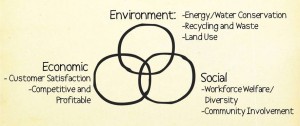What Sustainability Means At Kendall-Jackson
I know, I know, as soon as someone says sustainability you wonder “what exactly does that mean anyway?” In my posts we’ll be talking about how we view sustainability at Kendall-Jackson, why it’s important and what we’re doing to be a more sustainable winery.
As a family-owned business, we take seriously our responsibility to create a healthy future that we all can savor. So, let’s lead off with a question:
What does Sustainability mean to you?
That’s not an easy question to answer. Defining sustainability is complicated. It means different things to different people and opinions are rapidly evolving. Just think back to five years ago – most of us hadn’t even heard the term yet. Do you remember what you felt were the most important qualities of the products you buy. Maybe quality, maybe price?
If you were at the grocery store maybe you were looking for some healthy ingredients and less of the junk that you can’t even pronounce. What about clothing? Fits nice, good brand, reasonable price – ring it up.
Our attitudes have changed with all the new information we’ve been exposed to. We’ve heard lots about how food is grown can have an impact on our bodies and the environment; and organic food sales have doubled in five years. We learned about the working conditions of people making the products we consume from around the world; and fair trade coffee has tripled in five years and sweat shops are largely a thing of the past.
As we all learn more about our impacts on the environment and society the definition of sustainability expands. Sustainable, or green, products have been booming over the last few years, but they’re only the tip of the iceberg. Fostering a truly sustainable world requires businesses to start under the surface and grow from there. We use the international standard to define sustainability, known as the Triple Bottom Line:
“The planning and activity that takes into account the long-term maintenance and well-being of the environmental, social and economic demands of the world around us.”
So, it seems logical that consumers asking for more responsibly made products, produced by more responsibly run companies would result in a complete market shift. But it hasn’t, not yet anyway. Only a few companies are really taking the lead – and that’s what our program is all about.
Demonstrating Leadership
Here at Kendall-Jackson, we take the same approach to sustainability as we do with any other business activity– we demonstrate leadership. Whether it’s quality, customer service or sustainability, our expectations are to lead all industry. We don’t look out at the horizon and say “what’s the average company’s sustainability performance – OK, that good enough for us.” Excuse me for sounding a little proud, but we’re just not the kind of crowd that feels good about being average in anything we do.
In fact, the company has had strong individual programs for years, but nothing centralized. We’ve been using sustainable framing practices for over two decades to ensure healthy, productive vineyards for the future generations (we’re a family owned winery). Our health and safety program for our workers is second to none and we appreciate and rely on a diverse work force. Each year Kendall-Jackson, and hundreds of our employees, give time and financial support to our community.
As with most organizations, the first years of our official sustainability program have been centered on the environment. We’ve focused on reducing our footprint by conserving energy and water use. We had some great success in the first two years, but we know that we’ve got a much more to do – and we’ve got a plan to get there!
- Two facilities were awarded LEED Gold certification from the U.S. Green Building Council.
- All of our facilities and 10,545 acres of vineyard land that we own or operate are 3rd party certified under the Certified California Sustainable Winegrowing (CCSW) program.
- In Santa Barbara and Monterey Counties we have 4,200 acres of vineyards 3rd party certified under the Sustainability In Practice (SIP) program.
- In Napa and Sonoma Counties 100 acres of vineyards are 3rd-party certified under the California Certified Organic Farming (CCOF) program. Another 425 acres are being organically grown and will be eligible for certification after the three year probation period in 2011.
- Stratospheric Ozone Protection Award from the EPA in 2002.
Although we feel our investments and accomplishments put us on the leading edge, we know there is a lot more we can do. This year I’ll be sharing with you some of the great work the Kendall-Jackson team has done so far, and the ways we’re going to try to be better stewards of the land and the communities we share with our employees and neighbors.
Let me know what you think about what we’re doing or share new and cool ideas in the sustainability world!





